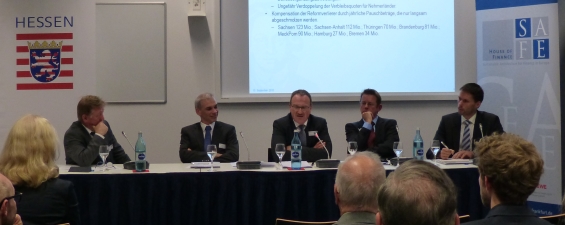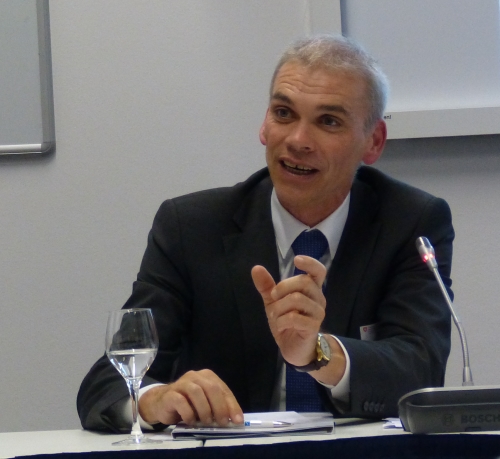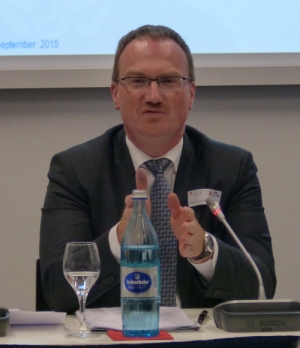
The legal basis for the German fiscal equalization scheme among the German federal states will expire by the end of 2019 in its current version. The required reorganization provides an opportunity to introduce a more efficient and more transparent equalization scheme. What can Germany learn from the past as well as from other federal countries, such as Switzerland, for the reform process? On 15 September, this question was discussed by Swiss and German experts at an event that was jointly organized by the SAFE Policy Center, the Consulate General of Switzerland in Frankfurt and the Ministry of Finance of the state of Hesse.
In her welcoming remarks, Bernadette Weyland, State Secretary of the Ministry of Finance of the state of Hesse, emphasized that the ongoing political negotiations on the reorganization of the equalization scheme have not yet reached a conclusion. She expressed the hope that Germany can learn from Switzerland, especially as Switzerland recently reformed its equalization scheme in 2007. The Swiss Consul General Markus Meli stressed that the reorganization of the Swiss equalization scheme has strengthened the financial autonomy of the cantons. The aim of the reorganization was to reduce but not to eliminate the differences in financial strengths between the cantons.
 In his keynote speech, Pascal Utz from the Swiss Federal Department of Finance explained that, in contrast to Germany, there is tax competition between the different cantons and municipalities in Switzerland. Some tax rates differe substantially, he said. In the framework of the Swiss equalization scheme, cantons with ample resources and the federal government transfer money to cantons with fewer resources. This equalization of resources is based on an index for the cantonal resource and tax potential. Tax competition can be maintained within this process, Utz said. Most importantly, the equalization scheme is designed in such a way that the growth potential of the cantons is not weakened by the compensation payments.
In his keynote speech, Pascal Utz from the Swiss Federal Department of Finance explained that, in contrast to Germany, there is tax competition between the different cantons and municipalities in Switzerland. Some tax rates differe substantially, he said. In the framework of the Swiss equalization scheme, cantons with ample resources and the federal government transfer money to cantons with fewer resources. This equalization of resources is based on an index for the cantonal resource and tax potential. Tax competition can be maintained within this process, Utz said. Most importantly, the equalization scheme is designed in such a way that the growth potential of the cantons is not weakened by the compensation payments.
The ensuing panel discussion was moderated by Stephan Lorz from the German business daily “Börsen-Zeitung”. Alfons Weichenrieder, Professor of Economics and Public Finance at Goethe University and Principal Investigator in SAFE, criticized that the debate about the German fiscal equalization scheme is mainly about the horizontal tax equalization while the preceding distribution of sales tax revenues among states (“Umsatzsteuervorwegausgleich”) is hardly taken into account. However, at both stages similar amounts of money are being redistributed between the federal states. Some states, such as North Rhine-Westphalia (NRW), would receive money from the horizontal tax equalization but, at the same time, pay into the sales taxes distribution at the first stage. In sum, NRW would even pay more money than it receives, Weichenrieder explained. Therefore, in his view, the criterions on the different stages of the scheme are inconsistent and not sufficiently transparent. Weichenrieder also believes that the equalization rate should be decreased from currently around 99% to, for example, 85%, as is the case in Switzerland. Otherwise, the alignment of fiscal capacity is taken too far. This is particularly important if you take into account that the costs of living are the highest in the German federal states that traditionally have to pay most into the equalization scheme, he said.
 Lars Feld, Professor for Economic Policy at the University of Freiburg, director of the Walter Eucken Institute and member of the German Council of Economic Experts, warned that the existing German equalization scheme could be maintained in a similar form even after 2019, if the states are not able to agree on a new scheme. Feld also thinks that the fiscal autonomy of the German federal states as well as their responsibility for their state debts should be increased when reforming the equalization scheme. The difficult reform process in Switzerland was successful mainly because of the economically difficult situation in Switzerland in the 1990s that had increased the reform pressure on the country. Feld is pessimistic that Germany can at this stage implement an equally successful reform, given that the country currently feels overly optimistic with respect to its economic strength. Peter Mischler from the Conference of Cantonal Finance Directors stressed that with the new Swiss equalization scheme, an efficient redistribution system was established in Switzerland and that the achieved greater transparency could serve as a blueprint for Germany.
Lars Feld, Professor for Economic Policy at the University of Freiburg, director of the Walter Eucken Institute and member of the German Council of Economic Experts, warned that the existing German equalization scheme could be maintained in a similar form even after 2019, if the states are not able to agree on a new scheme. Feld also thinks that the fiscal autonomy of the German federal states as well as their responsibility for their state debts should be increased when reforming the equalization scheme. The difficult reform process in Switzerland was successful mainly because of the economically difficult situation in Switzerland in the 1990s that had increased the reform pressure on the country. Feld is pessimistic that Germany can at this stage implement an equally successful reform, given that the country currently feels overly optimistic with respect to its economic strength. Peter Mischler from the Conference of Cantonal Finance Directors stressed that with the new Swiss equalization scheme, an efficient redistribution system was established in Switzerland and that the achieved greater transparency could serve as a blueprint for Germany.

